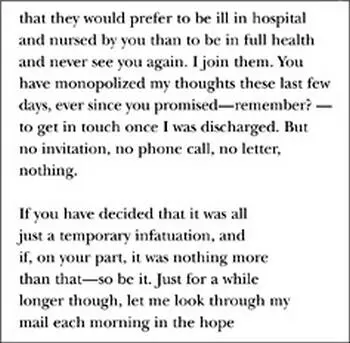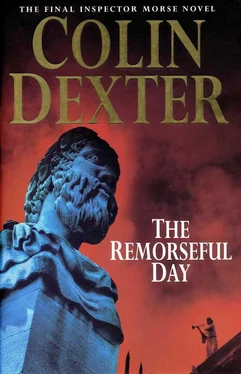“Do you have any superiors, sir?”
On reflection, Lewis was more than a little pleased with that last question: just the sort of thing Morse would have asked. Was he, Lewis, just a little — after all this time — moving gradually nearer to Morsean wavelength?
At a quarter past four he walked along the corridor to Morse’s office, to cast a fresh eye (so he promised himself) on that bizarre, that puzzling, that haunting evening of Yvonne Harrison’s murder — the source of so much trouble and tragedy.
Very soon he was virtually certain that he had seen none of the contents of that fourth box-file before; and had convinced himself that this was not merely a matter of some redistribution of the case documents. The file contained the sort of personal items that many women, and doubtless many men, keep in one of the locked drawers of their desks or bureaus, often with some sense of guilt.
There were all the usual things that from experience Lewis had known so well: letters, many of them in their original envelopes, some from women, most of them from men; photographs, many of them of Yvonne herself (one topless) with a variety of men friends; postcards from many a quarter of the globe, but mostly from Greece and Switzerland; three slim (unopened) bottles of perfume; various receipts for the purchase of ultraexpensive clothes and shoes. But for all the variety of material there, the box was scarcely half-full, and Lewis took his time. He looked at the photographs reasonably quickly (not quite so quickly at one of them, perhaps), before reading slowly (though not as slowly as Morse would have done) through the letters.
Then he saw it:

That was all. Just one small page of a longer letter. No date, no address, no salutation, no valediction, no name — nothing. And yet everything. Because the letter was written in that small, neatly formed upright script that was recognizable everywhere in the Thames Valley Police HQ.
As he reread the page, Lewis was suddenly aware of another presence in the office; and looked up to find Chief Inspector Morse standing silently in the doorway.
Don’t tell me, sweet, that I’m unkind
Each time I black your eye,
Or raise a weal on your behind—
I’m just a loving guy.
We both despise the gentle touch,
So cut out the pretence;
You wouldn’t love it half as much
Without the violence.
(Roy Dean, Lovelace Bleeding )
Anyone wishing to take up Morse’s earlier promise of being available the following Monday morning would have been disappointed, since he had put in no appearance by lunchtime. Yet he was not idle during those morning hours; and any visitor to the bachelor flat would have found him seated at his desk for much of the time; and for a fair proportion of that time found him writing quite busily and (as we have seen) very neatly. His old typewriter (with its defective “e” and “t”) sat at his elbow; but he had never mastered the keyboard skills with any real confidence, and he wrote now in longhand with a medium-blue Biro.
For Priority Consideration
Several things have happened these last few days which have prompted me to put down in writing my own thoughts on the present state of play.
First, I’ve been waking up every day recently, after some nightmarish nights, with a premonition that some disaster is imminent. Whether death comes into such a category, I’m not sure. I can’t agree with Socrates, though, that death is a blessing devoutly to be wished, even if it is (as I hope it is, as I believe it is) one long completely dreamless sleep. For the very fact of being alive is surely the best thing that’s happened to (almost) all of us.
Second, the last murder case entrusted to the pair of us has been (one or two loose ends though) satisfactorily resolved. Repp and Flynn were murdered by Barron, and the murderer himself is now dead. So any further insight into the original Harrison murder from their angles is wholly precluded.
Third, I’m certain that Frank Harrison has been the paymaster. It’s high time we brought him into HQ for intensive questioning, either directly about the murder of his wife, or at the very least about some culpable complicity of her murder.
Fourth, I’m also convinced that Yvonne H. was murdered by one of her own family. Nothing else makes any sense at all, not to me anyway. That murder was not premeditated: few of them are. It was committed spontaneously, viciously, involuntarily perhaps, by whichever of the three it was who found Yvonne Harrison in a situation that was utterly unexpected — kinkiness, perversion, degradation, all rolled up into one.
On the face of it, the husband is the outsider of the three, so you will appreciate, Lewis, that in my book he’s the favorite. It’s the “why” that worries me, though. He wasn’t and isn’t anybody’s fool, and he must have known more than enough about his wife’s tastes in bondage and possibly masochism. So I just can’t see blazing jealousy as his motive, especially since, as I strongly suspect, he regularly experienced the (reported) joys of extramarital sex himself.
A confession here.
Quite a few times I’ve found myself looking at the faces of people concerned with this case and thinking I’d seen them somewhere before. I thought it might be the result of interbreeding in a small community — no wonder some of the villagers are pretty tight-lipped! And I was right. That fruit-machine addict, for example: Allen Thomas. That’s how you spell his name by the way, Lewis. I found it in the village-school records: Allen Alfred Thomas. Unusual these days, that spelling of “Allen.” And “Alfred” belongs more to the first half of the century, doesn’t it? I also found out (well, Dixon found out) that the Christian names of Elizabeth Jane Thomas’s father were “Harold Alfred”; and that someone else in the village had a father with the Christian names “Joseph Allen.” That someone else was Frank Harrison. And (believe me!) he was the father of the lad, and Elizabeth decided to give him a couple of Christian names that, at least for herself, could confer some little pretense of legitimacy of her illegitimate son. (I wonder if his father gives him a fruit-machine allowance?)
Let’s turn to the Harrison children.
Either of them could have murdered their mother. What would be the motive, though? I just can’t see Sarah suddenly turning to murder because she finds her mother abed with one of her many lovers. What does it really matter to her that her mother enjoys a bit of biting and bondage occasionally? Shocked and disgusted? Yes, she’d certainly have been both. But driven to murder? No. There’s something about her, though — something that tells me that she’s up to her very smooth neck in things.
What about Simon Harrison? As we know he’s always been a bit of a mummy’s darling: a boy disadvantaged because of early deafness; a boy always needing extra understanding and extra love, and who found it (hardly surprisingly) from his mother. I’d guess myself that for Simon this relationship had always been very precious. Sacrosanct almost. I’d also guess that he had no notion whatsoever of his mother’s idiosyncratic tastes in sexual gratification. Then one night, the night of the murder, he’d driven out to see her. And why not? Just to say hello, perhaps? Like his sister, he had a key to the front door, and he entered the house and disturbed the copulating couple — copulating in the most extraordinary circumstances; and he would have been shocked and disgusted (like his sister) but heartbroken, too, and disillusioned and betrayed. His mother performing those things with some plebeian local builder!
Читать дальше













